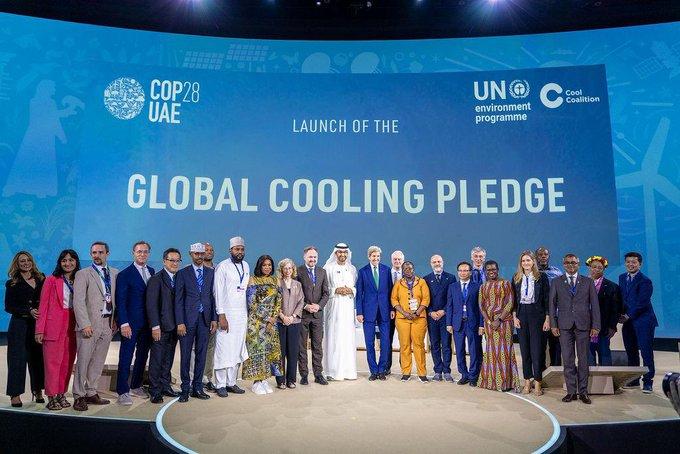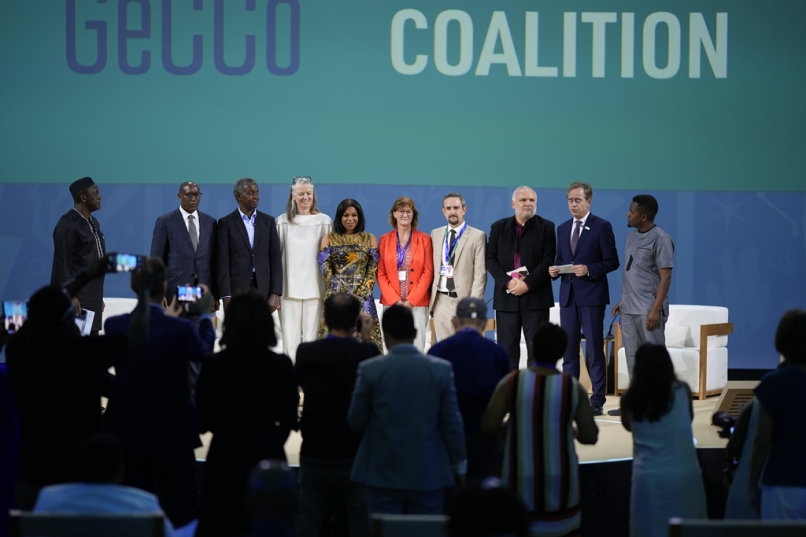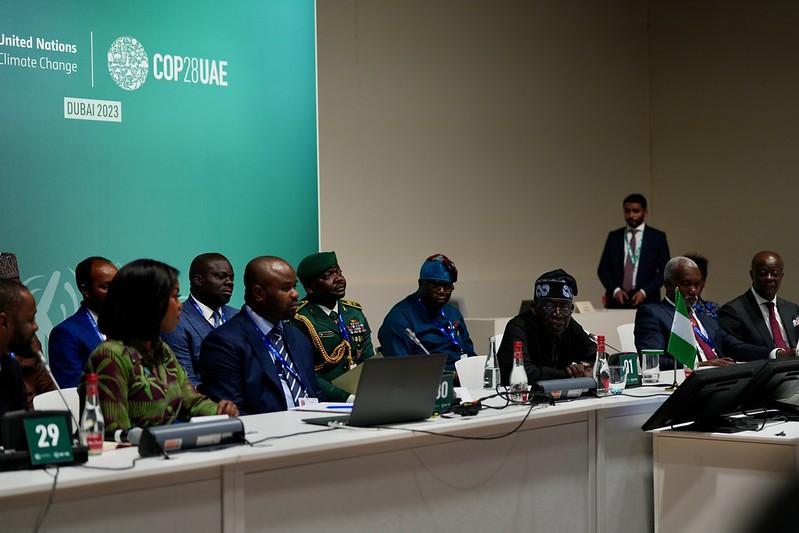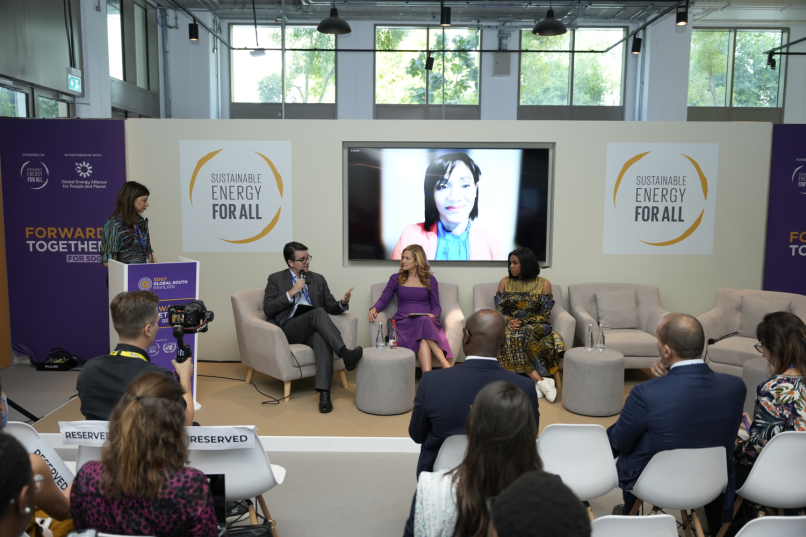Key takeaways and highlights from COP28
A landmark Global Stocktake – with exceptions
COP28 will be best remembered for the outcome of the Global Stocktake (GST). For the first time, Parties agreed to include language on the urgent need for “transitioning away from fossil fuels” in the final text of the conference. While the final GST text falls short of calling for a full phaseout of fossil fuels, it does break new ground and makes a welcome start to advance the discourse on phasing out of fossil fuels while also honouring the common but differentiated responsibility backbone of the UNFCCC process.
A momentous positive signal in the final text is the call for countries to triple renewable energy capacity globally and double the global average annual rate of energy efficiency improvements by 2030 – both critical to fighting climate change and ending energy poverty. This is a welcome inclusion that SEforALL is proud to have supported and influenced.
However, finance is one area where the final text falls short. There is little reference to finance in the text overall. While Parties expressed that developed countries have a responsibility to support developing countries, they did not establish clear finance targets that are in line with developing countries’ actual needs for transitioning their energy systems.
Annual clean energy investments in emerging and developing economies will need to more than triple to USD 2.8 trillion by the early 2030s to meet rising energy needs and align with the climate goals set out in the Paris Agreement. Yet, the Global Stocktake continues to encourage developed countries to jointly provide USD 100 billion per year in climate finance, an old target that was never met and spans more than just clean energy investment. That amount is also woefully short of what is required for developing countries to meet their Global Stocktake obligations.
Finally, COP28 was unsuccessful in producing any decisions on Article 6.2 and 6.4 on bilateral trading and carbon markets. This is especially worrisome because carbon trading activities will continue without guidance or international agreement on transparency and integrity standards for an important mitigation instrument.
Transformative new initiatives
It was encouraging to see the breadth of initiatives launched during COP28 that will help address current gaps in ambition, resources and support for a just and equitable energy transition. Many of these focus on nascent opportunities or areas of the energy transition that are easily overlooked but have significant social and economic impacts on developing countries and vulnerable groups.
SEforALL is proud to have worked with partners in designing or launching the following:
Global Cooling Pledge
More than 60 countries signed the Global Cooling Pledge, an initiative led by the COP28 Presidency alongside the U.N. Environment Programme's (UNEP) Cool Coalition, which SEforALL supports.
The Global Cooling Pledge aims to expand sustainable cooling to protect the most vulnerable communities while limiting the emissions produced by the cooling sector.
National government participants of the Global Cooling Pledge have committed to work together to reduce cooling-related emissions across all sectors by at least 68 percent globally relative to 2022 levels by 2050, consistent with limiting a global average temperature rise to 1.5°C.
Global Electric Cooking Coalition
A coalition of anchor partners that includes Energising Development (EnDev), GEAPP, the Modern Energy Cooking Services (MECS) programme, and SEforALL launched the Global Electric Cooking Coalition on 5 December.
With 2.3 billion worldwide without access to clean cooking solutions or technologies, the Global Electric Cooking Coalition (GeCCo) will unite efforts to promote the transition to electric cooking.
GeCCo’s initial target is to enable a mass transition into electric cooking in at least 10 countries in Sub-Saharan Africa, Asia, and Latin America and the Caribbean in seven years, where electricity increasingly becomes the cooking fuel of choice for a significant (>10%) proportion of households and institutions.
Mission Efficiency Call to Action on energy efficiency
During COP28, approximately 123 countries pledged to triple installed renewables capacity and double energy efficiency measures by 2030.
To help countries realize their energy efficiency commitment, Mission Efficiency launched a Call to Action, whereby countries, companies and organizations could express their support for establishing a global target of more than double the rate of energy efficiency improvement annually. Those joining the Call to Action also affirmed that tripling investment to more than USD 1.5 trillion per year from 2026 to 2030 is required to meet this target.
Beyond simply advocating for these targets, the Mission Efficiency Call to Action encouraged those joining to submit concrete pledges or UN Energy Compacts for how they will contribute to energy efficiency progress.
Africa Energy Transition Partnership
This partnership between SEforALL and UNOPS will support the implementation of Energy Transition and Investment Plans in Global South countries by mobilizing and directing finance to key energy projects. UNOPS will be responsible for managing the funds and providing operational and administrative support, while SEforALL will provide access to finance and technical assistance.
Battery Energy Storage System Consortium
The Global Leadership Council of the Global Energy Alliance for People and Planet (GEAPP) announced that Barbados, Belize, Egypt, Ghana, India, Kenya, Malawi, Mauritania, Mozambique, Nigeria, and Togo committed to the Battery Energy Storage Systems (BESS) Consortium
This group of ten first-mover countries are part of a collaborative effort to secure 5 gigawatts (GW) of BESS commitments by the end of 2024, supported by a group of resource partners, including SEforALL.
Nigeria Carbon Market and Electric Buses Rollout Programme
This presidential initiative was launched by H.E. Bona Tinubu at COP28. It aims to deploy a fleet of 100 electric buses and establish robust, credible carbon markets in Nigeria. It will be supported by the Nigeria Energy Transition Office, established by SEforALL, and the Africa Carbon Market Initiative, in which we partner.
SDG7 Global South Pavilion
In partnership with the Global Energy Alliance for People and Planet (GEAPP), we hosted the SDG7 Global South Pavilion to once again elevate the criticality of the energy, climate and development nexus.
The pavilion was home to over 50 speaking and networking events from 1-10 December and provided a platform for our partners to make announcements and connect with people and expertise that will help advance their work.
Besides showcasing the transformative initiatives described above, key moments at the pavilion included the US Government announcing that it is joining the 24/7 Carbon-Free Energy Compact; the release of SEforALL’s study on how climate finance can help power healthcare facilities with renewable energy; and Acumen unveiling its Hardest-to-Reach fund, a USD 250 million initiative to activate clean energy markets in Africa’s underserved geographies.
We look forward to carrying the momentum generated by COP28 into the 2024 SEforALL Global Forum in June 2024, when we will look to secure even greater commitments for a just and equitable energy transition.
Explore all our photos from COP28 on our Flickr page.




